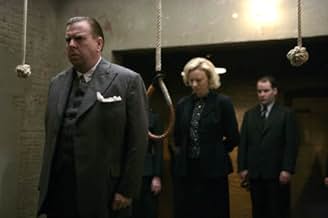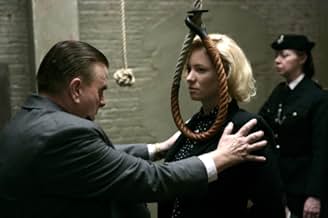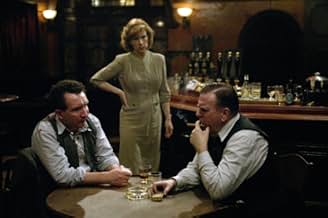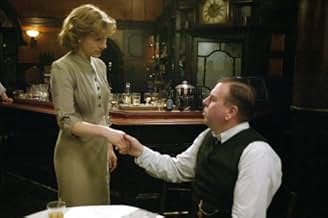NOTE IMDb
7,4/10
5,9 k
MA NOTE
Ajouter une intrigue dans votre langueThe life and times of Albert Pierrepoint - Britain's most prolific hangman.The life and times of Albert Pierrepoint - Britain's most prolific hangman.The life and times of Albert Pierrepoint - Britain's most prolific hangman.
- Réalisation
- Scénario
- Casting principal
- Nomination aux 1 BAFTA Award
- 2 victoires et 4 nominations au total
Lizzie Hopley
- Dorothea Waddingham
- (as Elizabeth Hopley)
Avis à la une
Capital punishment in Great Britain was abolished in 1964. Prior to that date there were many Home Office appointed Hangmen, none more prolific than Albert Pierrepoint, who served from 1932 to 1956, during which time he hanged an estimated 433 men and 17 women.
Following his father Henry and uncle, Thomas, into the family 'trade', Pierrepoint became the number one hangman in Britain and his career brought him into contact with many notorious criminals including "Lord Haw-Haw" ("Germany Calling"), real name William Joyce; John George Haigh, the famous "acid bath murderer"; Derek Bentley, still a controversial case and the subject of the 1991 film LET HIM HAVE IT; Ruth Ellis, the last woman to be hanged in Britain, and again the subject of a movie, DANCE WITH A STRANGER (1985); gangster, Antonio "Babe" Mancini; Theodore Schurch, the last person to be executed for treason in Britain. Perhaps the most controversial case in Pierrepoint's career was that of Timothy Evans, whose wife and baby daughter had been found murdered at their home at 10 Rillington Place, also the home of one John Reginald Christie. Evans was executed in 1950. Christie was later charged with the murders of seven women and hanged in 1953. Evans was eventually granted a posthumous pardon in 1966. Evans was played harrowingly by John Hurt in the 1971 movie 10 RILLINGTON PLACE, with Richard Attenborough as a chilling Christie (according to John Hurt on the DVD commentary for 10 RILLINGTON PLACE, Pierrepoint himself actually offered his services, under an assumed name, as technical adviser for the hanging scene in that film as the actual method was covered by the Official Secrets Act and, ever the professional, Pierrepoint wanted it re-creating accurately, and nor would he have wished his work to be misrepresented).
Pierrepoint's body of work (if you'll forgive the expression) was greatly affected by World War II, and he worked all over Europe including Germany, Cyprus, Gibraltar and Austria. It is believed that in 1945 he hanged 190 men and 10 women war criminals at Hameln prison in the British controlled sector of Germany, including Irma Greese, Elizabeth Volkenrath, Juana Boreman and the "Beast of Belsen", Josef Kramer. During the war itself he had assisted his uncle Thomas in the execution of 16 American soldiers, condemned by Court Martial for murder and rape, at a military prison in Somerset. The movie carefully portrays Pierrepoint the man, not Pierrepoint the executioner. When he does his work he leaves Albert Pierrepoint outside. He is totally professional: he doesn't care who they are or what they've done, all that matters to him is that they are human beings who have to die and he will achieve that as quickly and humanely as possible. All that matters to him is height, weight and physical condition. He is also portrayed as compassionate. When organising the order of the hanging of the German war criminals he selects a girl, who has just accused him of doing the Jews work for them, to be hanged first. His army assigned assistant agrees as she's an 'arrogant bitch'. 'No,' says Pierrepoint, 'she's the youngest. She'll be the most frightened.' And after the deed he insists that the remains be treated with due reverence: 'They've paid the price. They're innocent now. D'y'see?' The publicity surrounding the Nazi war criminals disturbs Pierrepoint, as people applaud him in the street and buy him drinks in the newly acquired pub owned by himself and his wife. This isn't right to him. What he does, his job, is private, he does not even discuss it with his wife. All this attention isn't right. Also there is now an ever growing movement opposed to capital punishment. To some he is a national hero, to an increasing number of others he is a murderer. He starts to question his role. Timothy Spall, known as a dry, comedic actor on British TV (AUF WIEDERSEHEN, PET) and usually the slimy, slightly dopey, comic villain in movies like HARRY POTTER and LEMONY SNICKETT, is mesmerising as Pierrepoint. He portrays a quiet, gentle man, and one who regards his profession with honour and pride. He is appointed by the Government; he is the best in the land. His is not to question the law or the decisions of the lawmakers; his is to do his duty to the best of his ability. And he does. Only when his own notoriety, the hanging of his friend and the changing mood of the country toward capital punishment creep into the melting pot, does his resolve start to falter, and only when the various prison authorities start haggling over payments for his services, something he sees as an insult to his position as Chief Executioner, does he consider resigning, which of course he finally does. There are a few historical inaccuracies and inconsistencies (such as the main fact that he was not the last executioner. Capital Punishment continued for another eight years after Pierrepoint's resignation) but this is the norm for this kind of movie, and on the whole the film is as accurate as any film covering over 20 years in 90 minutes. The acting is excellent in all quarters, particularly Juliet Stevenson, though Spall leads by a length. The period is very well captured and is a close cousin to VERA DRAKE in this respect. The main thing about this movie is that it lingers with you and makes you want to think and learn more about its subject. With Pierrepoint's 'clients' having played such a large part in cinema history, it's time we had a movie about the man himself. And this is it. Recommended.
Following his father Henry and uncle, Thomas, into the family 'trade', Pierrepoint became the number one hangman in Britain and his career brought him into contact with many notorious criminals including "Lord Haw-Haw" ("Germany Calling"), real name William Joyce; John George Haigh, the famous "acid bath murderer"; Derek Bentley, still a controversial case and the subject of the 1991 film LET HIM HAVE IT; Ruth Ellis, the last woman to be hanged in Britain, and again the subject of a movie, DANCE WITH A STRANGER (1985); gangster, Antonio "Babe" Mancini; Theodore Schurch, the last person to be executed for treason in Britain. Perhaps the most controversial case in Pierrepoint's career was that of Timothy Evans, whose wife and baby daughter had been found murdered at their home at 10 Rillington Place, also the home of one John Reginald Christie. Evans was executed in 1950. Christie was later charged with the murders of seven women and hanged in 1953. Evans was eventually granted a posthumous pardon in 1966. Evans was played harrowingly by John Hurt in the 1971 movie 10 RILLINGTON PLACE, with Richard Attenborough as a chilling Christie (according to John Hurt on the DVD commentary for 10 RILLINGTON PLACE, Pierrepoint himself actually offered his services, under an assumed name, as technical adviser for the hanging scene in that film as the actual method was covered by the Official Secrets Act and, ever the professional, Pierrepoint wanted it re-creating accurately, and nor would he have wished his work to be misrepresented).
Pierrepoint's body of work (if you'll forgive the expression) was greatly affected by World War II, and he worked all over Europe including Germany, Cyprus, Gibraltar and Austria. It is believed that in 1945 he hanged 190 men and 10 women war criminals at Hameln prison in the British controlled sector of Germany, including Irma Greese, Elizabeth Volkenrath, Juana Boreman and the "Beast of Belsen", Josef Kramer. During the war itself he had assisted his uncle Thomas in the execution of 16 American soldiers, condemned by Court Martial for murder and rape, at a military prison in Somerset. The movie carefully portrays Pierrepoint the man, not Pierrepoint the executioner. When he does his work he leaves Albert Pierrepoint outside. He is totally professional: he doesn't care who they are or what they've done, all that matters to him is that they are human beings who have to die and he will achieve that as quickly and humanely as possible. All that matters to him is height, weight and physical condition. He is also portrayed as compassionate. When organising the order of the hanging of the German war criminals he selects a girl, who has just accused him of doing the Jews work for them, to be hanged first. His army assigned assistant agrees as she's an 'arrogant bitch'. 'No,' says Pierrepoint, 'she's the youngest. She'll be the most frightened.' And after the deed he insists that the remains be treated with due reverence: 'They've paid the price. They're innocent now. D'y'see?' The publicity surrounding the Nazi war criminals disturbs Pierrepoint, as people applaud him in the street and buy him drinks in the newly acquired pub owned by himself and his wife. This isn't right to him. What he does, his job, is private, he does not even discuss it with his wife. All this attention isn't right. Also there is now an ever growing movement opposed to capital punishment. To some he is a national hero, to an increasing number of others he is a murderer. He starts to question his role. Timothy Spall, known as a dry, comedic actor on British TV (AUF WIEDERSEHEN, PET) and usually the slimy, slightly dopey, comic villain in movies like HARRY POTTER and LEMONY SNICKETT, is mesmerising as Pierrepoint. He portrays a quiet, gentle man, and one who regards his profession with honour and pride. He is appointed by the Government; he is the best in the land. His is not to question the law or the decisions of the lawmakers; his is to do his duty to the best of his ability. And he does. Only when his own notoriety, the hanging of his friend and the changing mood of the country toward capital punishment creep into the melting pot, does his resolve start to falter, and only when the various prison authorities start haggling over payments for his services, something he sees as an insult to his position as Chief Executioner, does he consider resigning, which of course he finally does. There are a few historical inaccuracies and inconsistencies (such as the main fact that he was not the last executioner. Capital Punishment continued for another eight years after Pierrepoint's resignation) but this is the norm for this kind of movie, and on the whole the film is as accurate as any film covering over 20 years in 90 minutes. The acting is excellent in all quarters, particularly Juliet Stevenson, though Spall leads by a length. The period is very well captured and is a close cousin to VERA DRAKE in this respect. The main thing about this movie is that it lingers with you and makes you want to think and learn more about its subject. With Pierrepoint's 'clients' having played such a large part in cinema history, it's time we had a movie about the man himself. And this is it. Recommended.
Albert Pierrepoint was Britain's most prolific executioner, overseeing the hanging of more than 600 condemned men and women including Derek Bentley, Ruth Ellis and Lord Haw Haw. Adrian Shergold's film starring Timothy Spall in the title role is a dark period piece exploring the stark relationship between compassion and work ethic.
Pierrepoint approaches his grisly duties with pride, professionalism and a stoical detachment a third generation hangman, he is well accustomed to checking his personal life at the prison gate while he gets on with the job at hand.
But duty and morality are constantly battling in the back of his mind - a struggle neatly illustrated when he is seconded to Germany after the War and tasked with dispatching Nazi war criminals. His clinical work here is deliberately and uncomfortably linked to the crimes of the Nazis who gassed their Holocaust victims with the same brutal precision.
Back in England, as liberalism begins to take hold and high-profile executions enrage a population bubbling with discontent, Pierrepoint's reputation in the eyes of the public slides swiftly and irretrievably from British war hero to callous murderer a bewildering descent perfectly captured by Spall's mesmerising performance. Juliet Stevenson is not bad either as Pierrepoint's loyal wife gradually embittered by years of turning the other cheek at her husband's double life.
The film celebrates dignity and humanity but is laced with a uniquely British attitude evocative of Vera Drake and The Remains of the Day. Like these earlier social dramas, Pierrepoint culminates memorably in a momentary quivering of its previously resolute stiff upper lip.
Pierrepoint approaches his grisly duties with pride, professionalism and a stoical detachment a third generation hangman, he is well accustomed to checking his personal life at the prison gate while he gets on with the job at hand.
But duty and morality are constantly battling in the back of his mind - a struggle neatly illustrated when he is seconded to Germany after the War and tasked with dispatching Nazi war criminals. His clinical work here is deliberately and uncomfortably linked to the crimes of the Nazis who gassed their Holocaust victims with the same brutal precision.
Back in England, as liberalism begins to take hold and high-profile executions enrage a population bubbling with discontent, Pierrepoint's reputation in the eyes of the public slides swiftly and irretrievably from British war hero to callous murderer a bewildering descent perfectly captured by Spall's mesmerising performance. Juliet Stevenson is not bad either as Pierrepoint's loyal wife gradually embittered by years of turning the other cheek at her husband's double life.
The film celebrates dignity and humanity but is laced with a uniquely British attitude evocative of Vera Drake and The Remains of the Day. Like these earlier social dramas, Pierrepoint culminates memorably in a momentary quivering of its previously resolute stiff upper lip.
I'd just been through a run of watching many poorly made, uninspiring and disappointing films in the last year, then luckily I saw this film Pierrepoint aka The Last Hangman which restored my faith in cinema.
Like all excellent films, it a simple story, expertly performed by a very strong cast. The other great element of a quality film is that it can be interpreted in many different ways by its viewers.
It shouldn't be explained as a portrayal of a man who hanged people although that is exactly what he did, what made him famous and what he will be remembered for.
For me Pierrepoint is more about working life. The job was always going to be a vocation as his father had been a hangman before him and he wanted to live up to a man he admired. We see the ends that he goes to, to be the best in his chosen field and I must admit I thought this was shown brilliantly; his care, his attention to the task, his desire to see the job done right. In the period of time that this story is set your job was something you took pride in not something you exploited to get better money and benefits while doing as little effort as possible.
It is impossible to be completely accurate when making a biographical film as you are condensing a persons lifetime into a couple of hours of screen time so therefore the director, writers, editor and producers need to shorten, edit and take a certain amount of artistic license.
Fortunately I knew nothing about Albert Pierrepoint before I watched this film so I didn't know what had been left in and left out of this account of his life, since then I talked to my father who knew many things about the man as he had lived and worked in London just after hanging was abolished and had seen Pierrepoint interviewed. He told me about a few things that weren't shown in the film, things that would have given my father an opinion about what type of person this famous hangman was. I've asked my father to see the film as I want to know how the celluloid depiction compares to his memories of the real man; even if he believes it to be inaccurate I'll still watch it again.
It is a dark, sad film which wouldn't be a great date movie but maybe a film you should watch the next time you have a bad day at work.
Like all excellent films, it a simple story, expertly performed by a very strong cast. The other great element of a quality film is that it can be interpreted in many different ways by its viewers.
It shouldn't be explained as a portrayal of a man who hanged people although that is exactly what he did, what made him famous and what he will be remembered for.
For me Pierrepoint is more about working life. The job was always going to be a vocation as his father had been a hangman before him and he wanted to live up to a man he admired. We see the ends that he goes to, to be the best in his chosen field and I must admit I thought this was shown brilliantly; his care, his attention to the task, his desire to see the job done right. In the period of time that this story is set your job was something you took pride in not something you exploited to get better money and benefits while doing as little effort as possible.
It is impossible to be completely accurate when making a biographical film as you are condensing a persons lifetime into a couple of hours of screen time so therefore the director, writers, editor and producers need to shorten, edit and take a certain amount of artistic license.
Fortunately I knew nothing about Albert Pierrepoint before I watched this film so I didn't know what had been left in and left out of this account of his life, since then I talked to my father who knew many things about the man as he had lived and worked in London just after hanging was abolished and had seen Pierrepoint interviewed. He told me about a few things that weren't shown in the film, things that would have given my father an opinion about what type of person this famous hangman was. I've asked my father to see the film as I want to know how the celluloid depiction compares to his memories of the real man; even if he believes it to be inaccurate I'll still watch it again.
It is a dark, sad film which wouldn't be a great date movie but maybe a film you should watch the next time you have a bad day at work.
The movie tells the story of Albert Pierrepoint, Britain's most prolific hangman.
This may sound like the plot of a cheap exploitative movie but I can assure you this is a fantastic movie which respects the man, the profession, the people executed and deals with the conflicts this strange profession carries.
Thimothy Spall, a fantastic and very underrated actor, gives one of the best performances of his career.
I've seen this movie twice before and should definitely see it again.
Highly recommended
The Last Hangman Review
Mike Reynolds
It's a dirty job, but someone's got to do it. The clock strikes nine and the hangman goes to work, getting rid of criminals the old fashioned way. At the end of the day he puts on his cap and heads home to his wife like any other man. But what goes on in the head of an ordinary person who's job it is to kill? This is the question asked by Adrian Shergold, the director of The Last Hangman.
The film follows the true story of the rise of Britain's most prolific executioner, Albert Pierrepoint, and his struggle to be a lead a normal life. Pierrepoint is played by Timothy Spall, most noted for his great supporting roles in Vanilla Sky and The Last Samurai. Spall shines in this film, becoming both a calculating, intense killer and a jolly pub mate. As the film progresses, he literally transforms as his burden becomes greater. Juliet Stevenson plays Annie, Albert's arguably supportive wife. She portrays the guilt and paranoia of an English housewife painfully well. Through her, we see the full story of the couple's social and moral difficulties.
Pierrepoint's only real drive is that of any honest, hard working man. He just wants to be good at what he does. This keeps the audience in a emotionally conflicting state. The viewer desperately wants Albert to resign from his chilling career, while cheering on his incredible success.
The film is very nice to look at. What a feat. One can only imagine the difficulty of shooting a period piece independently. It was very interesting seeing the gritty grey streets of a wartime London recorded on 16. It seemed to give it a charming modern context, though there were jarring out of focus shots here and there. One memorable scene is brilliantly spliced with actual footage of a capital punishment protest.
Aside from the physical shooting of the film, there were strong symbolic devices at use. In order to hang someone efficiently, Pierrepoint would calculate the prisoner's height and weight. To do this he would look through a small peephole in the heavy cell door. Whenever anyone is shown through a crack, or a hole, it's a hint of grizzly foreshadowing. The method of passing time was artfully portrayed as well. Pierrepoint kept a logbook of all the people who he killed, their names written in perfect script. The stack of logbooks got bigger and bigger as years went by.
Films like The Last Hangman are important because they challenge our choices. This story makes us think of what we're responsible for in our lives and careers. Is the success worth the death of your inner self? That decision is up to us. Because the saddest thing about Albert Pierrepoint is that he applied for the job.
Mike Reynolds
It's a dirty job, but someone's got to do it. The clock strikes nine and the hangman goes to work, getting rid of criminals the old fashioned way. At the end of the day he puts on his cap and heads home to his wife like any other man. But what goes on in the head of an ordinary person who's job it is to kill? This is the question asked by Adrian Shergold, the director of The Last Hangman.
The film follows the true story of the rise of Britain's most prolific executioner, Albert Pierrepoint, and his struggle to be a lead a normal life. Pierrepoint is played by Timothy Spall, most noted for his great supporting roles in Vanilla Sky and The Last Samurai. Spall shines in this film, becoming both a calculating, intense killer and a jolly pub mate. As the film progresses, he literally transforms as his burden becomes greater. Juliet Stevenson plays Annie, Albert's arguably supportive wife. She portrays the guilt and paranoia of an English housewife painfully well. Through her, we see the full story of the couple's social and moral difficulties.
Pierrepoint's only real drive is that of any honest, hard working man. He just wants to be good at what he does. This keeps the audience in a emotionally conflicting state. The viewer desperately wants Albert to resign from his chilling career, while cheering on his incredible success.
The film is very nice to look at. What a feat. One can only imagine the difficulty of shooting a period piece independently. It was very interesting seeing the gritty grey streets of a wartime London recorded on 16. It seemed to give it a charming modern context, though there were jarring out of focus shots here and there. One memorable scene is brilliantly spliced with actual footage of a capital punishment protest.
Aside from the physical shooting of the film, there were strong symbolic devices at use. In order to hang someone efficiently, Pierrepoint would calculate the prisoner's height and weight. To do this he would look through a small peephole in the heavy cell door. Whenever anyone is shown through a crack, or a hole, it's a hint of grizzly foreshadowing. The method of passing time was artfully portrayed as well. Pierrepoint kept a logbook of all the people who he killed, their names written in perfect script. The stack of logbooks got bigger and bigger as years went by.
Films like The Last Hangman are important because they challenge our choices. This story makes us think of what we're responsible for in our lives and careers. Is the success worth the death of your inner self? That decision is up to us. Because the saddest thing about Albert Pierrepoint is that he applied for the job.
Le saviez-vous
- AnecdotesDespite the title Pierrepoint was not Britain's last hangman. He retired in the mid 1950s, shortly after executing Ruth Ellis. Britain never had a "last hangman", as the last two executions before suspension of capital punishment were carried out in different cities at the same time. The last two people executed were both guilty of the murder of John West, so it was decided to carry out the sentence at the same time in Aug 1964. People were still being sentenced to death In November 1965.
- GaffesThe Hamelin war criminal hangings took place in an execution chamber at the end of a cell corridor within the old prison itself, not in an aircraft hangar. Pierrepoint described this very clearly in his memoirs.
- Citations
Albert Pierrepoint: I did a lot of jobs in Germany. More than were really good for me. Too many really. I get so bloody tired now...
- ConnexionsFeatured in Adolf Hitler: The Greatest Story Never Told (2013)
- Bandes originalesMakin' Whoopee
Music by Walter Donaldson
Lyrics by Gus Kahn
Performed by Timothy Spall and Eddie Marsan
Meilleurs choix
Connectez-vous pour évaluer et suivre la liste de favoris afin de recevoir des recommandations personnalisées
- How long is Pierrepoint: The Last Hangman?Alimenté par Alexa
Détails
- Date de sortie
- Pays d’origine
- Langue
- Aussi connu sous le nom de
- Pierrepoint: The Last Hangman
- Lieux de tournage
- Sociétés de production
- Voir plus de crédits d'entreprise sur IMDbPro
Box-office
- Montant brut aux États-Unis et au Canada
- 23 192 $US
- Week-end de sortie aux États-Unis et au Canada
- 2 028 $US
- 3 juin 2007
- Montant brut mondial
- 824 856 $US
- Durée
- 1h 30min(90 min)
- Couleur
- Mixage
- Rapport de forme
- 1.85 : 1
Contribuer à cette page
Suggérer une modification ou ajouter du contenu manquant


































